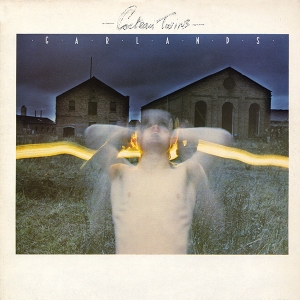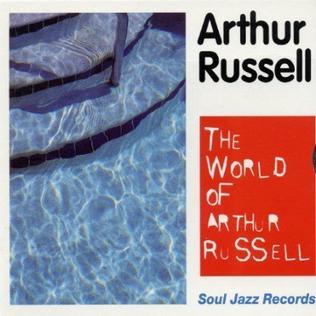Related Research Articles

Can were a German experimental rock band formed in Cologne in 1968 by Holger Czukay, Irmin Schmidt (keyboards), Michael Karoli (guitar), and Jaki Liebezeit (drums). They featured several vocalists, including the American Malcolm Mooney (1968–70) and the Japanese Damo Suzuki (1970–73). They have been hailed as pioneers of the German krautrock scene.

Geogaddi is the second studio album by Scottish electronic music duo Boards of Canada. It was originally released on 8 February 2002 in Japan by Vivid and in Europe ten days later by Warp Records. It was recorded between 1999 and 2001 at Hexagon Sun, their Pentland Hills studio. The album is intended to be darker in tone than their debut studio album Music Has the Right to Children, released in 1998. The album contains references to the Branch Davidians and numerology throughout its composition.

Garlands is the debut studio album by the Scottish alternative rock band Cocteau Twins. It was released on 10 July 1982 through the record label 4AD. It peaked in the Top 5 of the UK Independent Albums Chart and received support from BBC Radio 1 radio host John Peel.

Tago Mago is the second studio album by the German krautrock band Can, originally released as a double LP in August 1971 on United Artists Records. It was the band's first full studio album to feature vocalist Damo Suzuki after the departure of Malcolm Mooney the year prior, though Suzuki had been featured on most tracks on the 1970 compilation album Soundtracks. Recorded at Schloss Nörvenich, a medieval castle near Cologne, the album features long-form experimental tracks blending rock and jazz improvisation, funk rhythms, and musique concrète tape editing techniques.

New Gold Dream (81–82–83–84) is the fifth studio album by Scottish band Simple Minds. The album was released in September 1982 by record label Virgin, and was a turning point for the band as they gained critical and commercial success in the UK and Europe. It is considered one of the defining albums of the new pop movement of the early 1980s.

The Doldrums is the second album by American recording artist Ariel Pink, self-released in 2000. It is the second album credited to his solo music project, "Ariel Pink's Haunted Graffiti", and the second installment in his Haunted Graffiti series. On October 11, 2004, the album was released on the independent label Paw Tracks, owned by the music group Animal Collective. It received critical praise and has since been recognized for its influence on subsequent lo-fi acts. In 2020, a remastered edition of the album was released by Mexican Summer.
Neo-psychedelia is a diverse genre of psychedelic music that draws inspiration from the sounds of 1960s psychedelia, either updating or copying the approaches from that era. Originating in the 1970s, it has occasionally seen mainstream pop success but is typically explored within the alternative rock scene. It initially developed as an outgrowth of the British post-punk scene, where it was also known as acid punk. After post-punk, neo-psychedelia flourished into a more widespread and international movement of artists who applied the spirit of psychedelic rock to new sounds and techniques.
The Caretaker was a long-running project by English ambient musician, James Leyland Kirby. His work as the Caretaker is characterized as exploring memory and its gradual deterioration, nostalgia, and melancholia. The project was initially inspired by the haunted ballroom scene in the 1980 film The Shining, the 1978 TV show Pennies from Heaven, and the 1962 film Carnival of Souls. His first several releases comprised treated and manipulated samples of 1930s ballroom pop recordings. Most of his album covers were painted by one of his friends, Ivan Seal.

The World of Arthur Russell is a compilation album by Arthur Russell, released in 2004 on Soul Jazz Records.
Karl Blake is a vocalist, bassist, guitarist and multi-instrumentalist. Most of his own music can be described as progressive-experimental and sometimes psychedelic.
David Stubbs is a British music journalist. He grew up in Leeds and in the early 1980s was a student at the University of Oxford where he was a close friend of fellow journalist Simon Reynolds. The two were part of the Oxford-based collective that in 1984 launched the pop journal Monitor and then in 1986 both joined Melody Maker as staff writers.

Simon Reynolds is an English music journalist and author who began his career at Melody Maker in the mid-1980s. He subsequently worked as a freelancer and published a number of books on music and popular culture.

Red Mecca is the fourth studio album by English industrial band Cabaret Voltaire, released in September 1981 through Rough Trade Records.
Sampledelia is sample-based music that uses samplers or similar technology to expand upon the recording methods of 1960s psychedelia. Sampledelia features "disorienting, perception-warping" manipulations of audio samples or found sounds via techniques such as chopping, looping or stretching. Sampladelic techniques have been applied prominently in styles of electronic music and hip hop, such as trip hop, jungle, post-rock, and plunderphonics.
Italian occult psychedelia (IOP) is a subgenre of Italian psychedelic music characterized by obscure atmospheres. Italian occult psychedelia was coined by journalist Antonio Ciarletta in an article published by Italian music magazine Blow Up, in January 2012. A festival called Thalassa has occurred in Rome since 2013 to celebrate Italian occult psychedelia bands.

Hypnagogic pop is pop or psychedelic music that evokes cultural memory and nostalgia for the popular entertainment of the past. It emerged in the mid to late 2000s as American lo-fi and noise musicians began adopting retro aesthetics remembered from their childhood, such as radio rock, new wave pop, light rock, video game music, synth-pop, and R&B. Recordings circulated on cassette or Internet blogs and were typically marked by the use of outmoded analog equipment and DIY experimentation.
Electronic rock is a music genre that involves a combination of rock music and electronic music, featuring instruments typically found within both genres. It originates from the late 1960s when rock bands began incorporating electronic instrumentation into their music. Electronic rock acts usually fuse elements from other music styles, including punk rock, industrial rock, hip hop, techno and synth-pop, which has helped spur subgenres such as indietronica, dance-punk and electroclash.

Music for Stowaways is the debut album by English electronic act British Electric Foundation (B.E.F.), formed by musicians Martyn Ware and Ian Craig Marsh. The album released in the United Kingdom as a limited edition cassette in March 1981 by Virgin Records, who also released an LP version of the album titled Music for Listening To later in the year with a different track list and cover art, aiming its release for export markets. The Stowaways version was originally released concurrently with Ware and Marsh's first single with Heaven 17, "(We Don't Need This) Fascist Groove Thang", itself a developed version of the Music for Stowaways track "Groove Thang".

Stop Your Nonsense is the debut album by English musical duo Position Normal, released in August 1999 by Mind Horizon Recordings. The album is constructed primarily from samples and found sounds, often taken from unusual vintage sources such as second-hand children's records and answer machine cassettes, often purchased by member Chris Bailiff in jumble sales and charity shops, or inherited from his father. Bailiff's bandmate John Cushway also contributes instrumentation and vocals. Released to critical acclaim, Stop Your Nonsense was praised for its distinctively whimsical and eccentric style, with writer Simon Reynolds later crediting the album for pioneering hauntology music. Position Normal later re-released the album themselves.

Hauntology is a music genre or a loosely defined stylistic feature that evokes cultural memory and aesthetics of the past. It developed in the 2000s primarily among British electronic musicians, and typically draws on British cultural sources from the 1940s to the 1970s, including library music, film and TV soundtracks, psychedelia, and public information films, often through the use of sampling.
References
- ↑ Reynolds, Simon (1999). "POSITION NORMAL - Stop Your Nonsense / SAINT ETIENNE - Places to Visit". The Village Voice . Retrieved 5 June 2019.
- 1 2 Kellman, Andy. "Artist Biography by Andy Kellman". AllMusic. Retrieved 4 February 2019.
- 1 2 3 4 5 6 7 "Position Normal to play rare London live show". FACT. 19 July 2010. Retrieved 5 February 2019.
- 1 2 3 Stubbs, David. "Position Normal: Goodly Time (Rum) (Uncut review, May 2002)". Rocks Back Pages. Retrieved 5 February 2019.
- 1 2 Reynolds, Simon (2012). Retromania: Pop Culture's Addiction to its Own Past. London: Faber & Faber. pp. 333–335. ISBN 978-0571232093 . Retrieved 4 February 2019.
- 1 2 "Cassette playa: in praise of tapes". Fact. 26 July 2010. p. 3. Retrieved 5 February 2019.
- ↑ "2009 Rewind: Top 50 Releases of the Year". The Wire. January 2010. Retrieved 5 February 2019.
- ↑ "Excellent Brighton night The Outer Church announce debut compilation; Ekoplekz, Pye Corner Audio and Position Normal to feature". FACT. 19 June 2013. Retrieved 5 February 2019.